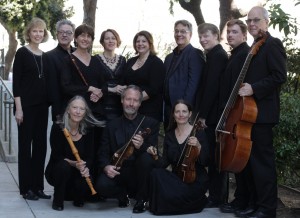San Francisco Chronicle Review: Magnificat showcases two biblical heroines
 This review by Joshua Kosman was published by the San Francisco Chronicle on March 11, 2015.
This review by Joshua Kosman was published by the San Francisco Chronicle on March 11, 2015.
Just in time for International Women’s Day — and only a few days late for the relevant holiday of Purim — the early-music ensemble Magnificat devoted the weekend to a celebration of strong biblical women. Sunday’s final concert at St. Mark’s Lutheran Church in San Francisco, dexterously led by Artistic Director Warren Stewart, made a pretty powerful case for two of them.
The music was by Marc-Antoine Charpentier, whose sacred works — including the dramatic oratorios that formed the meat of this program — stand at the heart of the 17th century French repertoire. The heroism, though, was all down to the women themselves.
One was Judith, the valiant widow who saves the city of Bethulia by beheading the Assyrian general Holofernes — thus inspiring a whole generation of bloody-minded Baroque painters — and the other was Esther, the Jewish ingenue who finds that marrying the Persian king is the key to averting mass slaughter. Both of them were embodied in music of nobility and grandeur.
Charpentier’s biblical narratives, sung in assiduously French-tinged Latin, are a fascinating blend of recitative, arioso and choral writing. Of the two works, “Esther” proved a bit more austere, with much of the tale conveyed by the narrator (a role that is sometimes done chorally and sometimes in various solo combinations).
Still, there’s ample room here for a florid song of praise at the end — sung with gorgeous abandon by soprano Laura Heimes — as well as shorter melodic set pieces for King Ahasuerus (tenor Daniel Hutchings) and the villainous Haman (bass Peter Becker). And though the instrumental textures are spare, for just two violins, two recorders and continuo, Charpentier adorns the vocal writing with plenty of alluring counterpoint.
“Judith,” as befits its martial story, is more given to spectacle. The besieged Israelites get a poignantly dissonant prayer of lamentation, both Holofernes and the Israelite camp have trios of military advisers (including countertenor Andrew Rader) to hash out the strategic issues in elaborate argument, and the heroine — alluringly sung by soprano Catherine Webster — lays out and springs her trap with a combination of seductive charm and steely guile.
As a splendid leavening to the dramatic and narrative thrust of the main pieces, Stewart filled out the program with a pair of Charpentier’s three-voice devotional works: the psalm setting “Super flumina Babylonis,” which has its own vein of tone-painting, and “Canticum in honorem Beata Virginis Mariae.” Both pieces were delivered with a blend of vocal majesty and reflective grace.